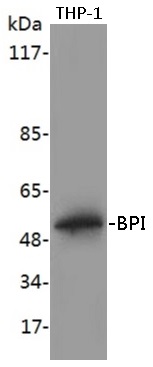The antimicrobial protein BPI is a 55 kDa protein found in the primary (azurophilic) granules of human neutrophils and has also been detected on surface of neutrophils, small intestinal and oral epithelial cells. BPI is a bactericidal compound that is present in polymorphonuclear cells (PMN) and in lower levels in the specific granules of eosinophils. BPI possesses high affinity toward the lipid A region of lipopolysaccharides (LPS) that comprise the outer leaflet of the gram-negative bacterial outer membrane. The binding of BPI to lipid A causes multiple anti-infective activities against gram-negative bacteria. These include: cytotoxicity via sequential damage to bacterial outer and inner lipid membranes, neutralization of gram-negative bacterial LPS, opsonization of bacteria to enhance phagocytosis by neutrophils. BPI may be a critical determinant in the development of LPStriggered airways disease since airway epithelial cells constitutively express the BPI gene and produce the BPI protein. Inflammation induced by LPS possibly contributes to the development of rapid airflow decline, a serious and often fatal complication of hematopoietic cell transplantation. Furthermore, a 21 kDa bioactive recombinant fragment of BPI, rBPI21, was shown to confer a survival advantage against invasive pneumococcal disease by binding to the gram-positive bacterial pathogen, pneumolysin. |
 Canada
Canada


